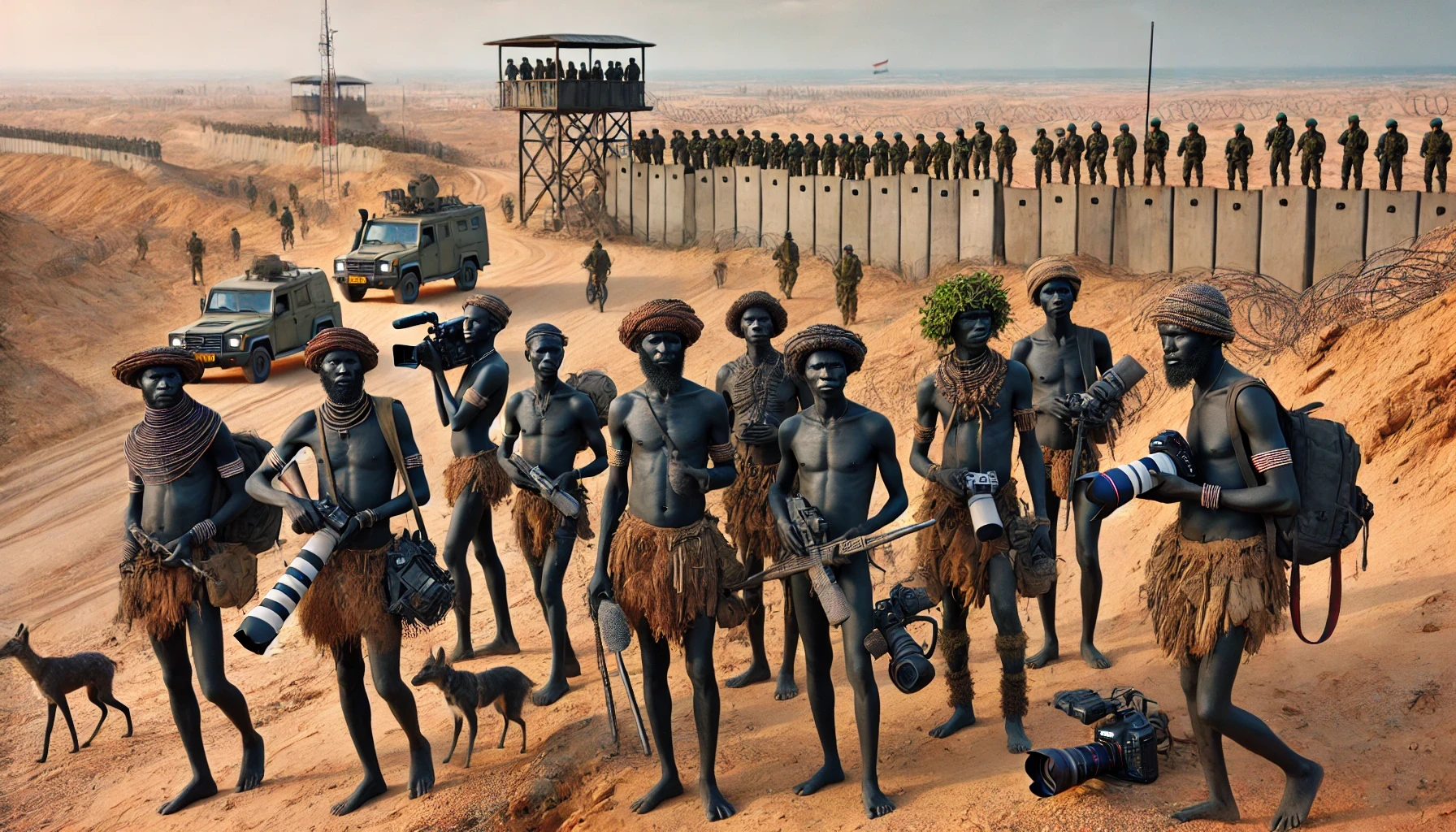In a move that has left the global journalism community both baffled and outraged, Israel has announced that it will be granting exclusive access to journalists from North Sentinel Island, a remote tribe known for its extreme isolation, into the Gaza Strip. The decision has sparked a wave of incredulity among international journalists, many of whom have been pleading—some practically begging—for access to cover the ongoing conflict in Gaza, only to find themselves outmaneuvered by a group that has famously shunned all contact with the outside world.
The Unlikeliest of Press Corps
North Sentinel Island, located in the Andaman and Nicobar Islands of India, is home to the Sentinelese, a tribe that has resisted contact with modern civilization for thousands of years. The Sentinelese are known for their hostile reception to outsiders, often responding with violence to any attempts at communication or contact. Despite—or perhaps because of—this extreme isolation, the Israeli government has decided that these Sentinelese individuals would provide the most “neutral” and “unbiased” coverage of the ongoing situation in Gaza.
Israeli officials have doubled down on their logic, arguing that the Sentinelese’s lack of exposure to global media narratives makes them the ideal candidates for reporting on the conflict. “We need fresh perspectives, and who better than those who have never been tainted by modern biases?” one official remarked. The idea is that these uncontacted tribespeople, unburdened by the preconceptions that plague so much of today’s media, would bring a truly objective viewpoint to the international stage.
International Journalists: “We’ve Been Shut Out”
The reaction from the global press corps has been swift and harsh. Journalists from leading media outlets across the world, who have been desperately seeking access to Gaza to provide on-the-ground coverage, are now expressing their frustration and disbelief. Many have highlighted the absurdity of the situation, noting that while they have spent years developing relationships and risking their lives to cover conflicts, they are now being sidelined in favor of a tribe that has never even seen a camera.
Several media organizations have issued formal complaints, arguing that the Israeli government’s decision undermines the role of professional journalism. “This is a farce,” said one veteran war correspondent. “We’re being pushed aside for a group of people who don’t even have a concept of what journalism is, let alone the ability to navigate the complexities of such a deeply rooted conflict.”
Others have taken to social media to express their dismay, with some journalists jokingly offering to trade places with the Sentinelese in a bid to gain access. “If it takes living on a remote island with no contact with the outside world to get a press pass in Gaza, sign me up,” one journalist tweeted sarcastically.
The Logistical Nightmare
Beyond the ethical and professional concerns, there are significant practical challenges to this plan. Transporting members of the Sentinelese tribe to Gaza, assuming they agree to leave their island (a colossal assumption in itself), presents numerous logistical and ethical dilemmas. The tribe has no exposure to modern technology, let alone the ability to comprehend the geopolitical complexities they would be reporting on. Additionally, there is the very real risk of exposing them to diseases for which they have no immunity—a scenario that could lead to catastrophic consequences.
Israel’s move has also raised questions about the potential exploitation of the Sentinelese. Human rights advocates have condemned the idea, arguing that this decision not only endangers the tribe but also makes a mockery of serious journalism. “This isn’t about neutral reporting; it’s about creating a spectacle,” said one critic from an international human rights organization.
The Bigger Picture: A Satirical Commentary?
For some, Israel’s decision to allow Sentinelese journalists into Gaza while blocking seasoned professionals is seen as a biting commentary on the state of global journalism. By granting access to the most unlikely of candidates, Israel could be highlighting the absurdity of the current media landscape, where biases, sensationalism, and preconceived narratives often overshadow the pursuit of truth. However, whether this was the intention or merely an unintended consequence of a poorly thought-out decision remains to be seen.
What’s Next?
As the world waits to see whether the Sentinelese will actually make the journey to Gaza—and what kind of reporting might emerge from it—journalists worldwide continue to voice their frustration. The situation has brought to light the increasingly fraught relationship between governments and the media in conflict zones, raising questions about access, bias, and the very nature of journalism in the 21st century.
While the idea of Sentinelese reporters in Gaza might seem far-fetched or even satirical, it underscores a much more serious issue: the lengths to which some governments will go to control the narrative, even if it means sidelining those best equipped to tell the story. Whether this experiment will succeed or fail spectacularly, one thing is certain—this will be a chapter in the history of journalism that no one saw coming.

